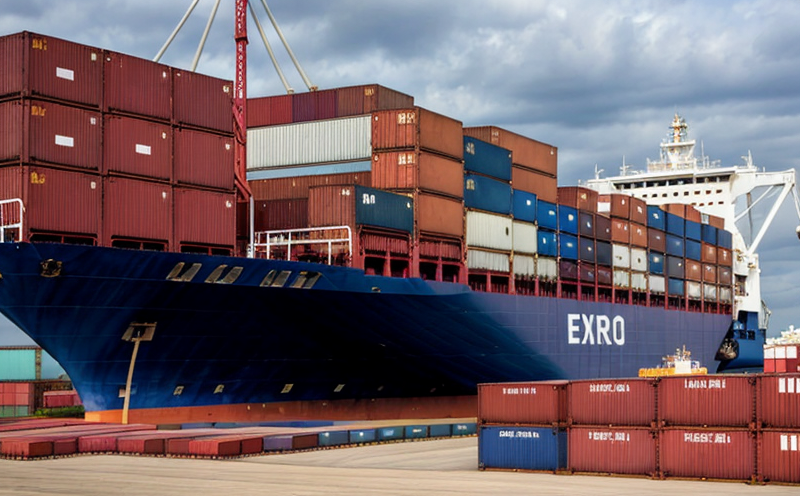
-
Trade and Government Regulations-
Customs and Import/Export Regulations-
Regulatory Requirements for Importers and Exporters
We provide comprehensive solutions designed to help our clients mitigate risks, enhance performance, and excel in key areas such as quality, health & safety, environmental sustainability, and social responsibility.
Discover
For many years, our organization has been operating successfully, boasting modern laboratories that meet international standards. These laboratories are equipped with the latest technology devices and equipment, and we have built a strong team of experienced and trained personnel to operate them.
DiscoverWelcome to Eurolab, your partner in pioneering solutions that encompass every facet of life. We are committed to delivering comprehensive Assurance, Testing, Inspection, and Certification services, empowering our global clientele with the ultimate confidence in their products and processes.
Discover
-
Trade and Government Regulations-
Customs and Import/Export Regulations-
Regulatory Requirements for Importers and ExportersRegulatory Requirements for Importers and Exporters
The world of international trade is a complex web of rules, regulations, and requirements that importers and exporters must navigate to ensure compliance and avoid costly penalties. As global trade continues to grow, the importance of understanding regulatory requirements has never been more crucial.
For importers and exporters, its essential to stay up-to-date on changing regulations, laws, and standards to avoid delays, fines, or even export bans. This article will provide an overview of regulatory requirements for importers and exporters, highlighting key points, definitions, and explanations in detailed bullet point formats.
Regulatory Requirements for Importers
Importers are responsible for ensuring compliance with regulations in their country of destination. The following are some key regulatory requirements for importers:
Obtaining necessary permits and licenses
Classifying goods according to Harmonized System (HS) codes
Valuing goods accurately for duty calculation
Meeting documentation requirements (e.g., commercial invoices, bills of lading)
Ensuring products meet local safety standards and regulations (e.g., CE marking for European Union)
Providing necessary documentation (e.g., certificates of conformity, test reports)
Labeling and packaging products according to local regulations
Ensuring products are environmentally friendly and meet local standards
Providing necessary documentation (e.g., environmental impact assessments, permits)
Meeting recycling and waste management requirements
Regulatory Requirements for Exporters
Exporters are responsible for ensuring compliance with regulations in their country of origin. The following are some key regulatory requirements for exporters:
Obtaining necessary permits and licenses
Classifying goods according to HS codes
Valuing goods accurately for duty calculation
Meeting documentation requirements (e.g., commercial invoices, bills of lading)
Ensuring compliance with restrictions on sensitive or prohibited items (e.g., arms, dual-use goods)
Obtaining necessary licenses and permits
Providing detailed documentation (e.g., end-user certificates, country-of-origin information)
Ensuring compliance with restrictions on trade with sanctioned countries or entities
Obtaining necessary licenses and permits
Providing detailed documentation (e.g., export control licenses, end-user certificates)
Detailed Explanation of Customs Regulations
Customs regulations are a critical aspect of international trade. Heres a more detailed explanation:

Industrial Equipment Certification
Industrial equipment certification is a critical process that ensures industrial equipment meets spe...

Construction and Engineering Compliance
Construction and Engineering Compliance: Ensuring Safety, Quality, and Regulatory Adherence In the ...

Pressure Vessels and Installations Testing
Pressure Vessels and Installations Testing Pressure vessels are a critical component of various ind...

Product and Retail Standards
Product and Retail Standards: Ensuring Quality and Safety for Consumers In todays competitive marke...

Food Safety and Testing
Food Safety and Testing: Ensuring the Quality of Our Food As consumers, we expect our food to be sa...

MDR Testing and Compliance
MDR Testing and Compliance: A Comprehensive Guide The Medical Device Regulation (MDR) is a comprehe...

Agricultural Equipment Certification
Agricultural equipment certification is a process that ensures agricultural machinery meets specific...

Fire Safety and Prevention Standards
Fire Safety and Prevention Standards: Protecting Lives and Property Fire safety and prevention stan...

Pharmaceutical Compliance
Pharmaceutical compliance refers to the adherence of pharmaceutical companies and organizations to l...

Energy and Sustainability Standards
In today’s rapidly evolving world, businesses face increasing pressure to meet global energy a...

Electrical and Electromagnetic Testing
Electrical and Electromagnetic Testing: A Comprehensive Guide Introduction Electrical and electrom...

Environmental Simulation Testing
Environmental Simulation Testing: A Comprehensive Guide In todays world, where technology is rapidl...

Trade and Government Regulations
Trade and government regulations play a vital role in shaping the global economy. These regulations ...

Healthcare and Medical Devices
The Evolution of Healthcare and Medical Devices: Trends, Innovations, and Challenges The healthcare...

Hospitality and Tourism Certification
Hospitality and Tourism Certification: Unlocking Opportunities in the Industry The hospitality and ...

Electromechanical Safety Certification
Electromechanical Safety Certification: Ensuring Compliance and Protecting Lives In todays intercon...

Aviation and Aerospace Testing
Aviation and Aerospace Testing: Ensuring Safety and Efficiency The aviation and aerospace industr...

Environmental Impact Assessment
Environmental Impact Assessment: A Comprehensive Guide Environmental Impact Assessment (EIA) is a c...

Battery Testing and Safety
Battery Testing and Safety: A Comprehensive Guide As technology continues to advance, battery-power...

IT and Data Center Certification
IT and Data Center Certification: Understanding the Importance and Benefits The field of Informatio...

Railway Industry Compliance
Railway Industry Compliance: Ensuring Safety and Efficiency The railway industry is a critical comp...

NEBS and Telecommunication Standards
Network Equipment Building System (NEBS) and Telecommunication Standards The Network Equipment Bu...

Military Equipment Standards
Military Equipment Standards: Ensuring Effectiveness and Safety The use of military equipment is a ...

Automotive Compliance and Certification
Automotive Compliance and Certification: Ensuring Safety and Efficiency The automotive industry is ...

Transportation and Logistics Certification
Transportation and Logistics Certification: A Comprehensive Guide The transportation and logistics ...

Cosmetic Product Testing
The Complex World of Cosmetic Product Testing The cosmetics industry is a multi-billion-dollar ma...

Renewable Energy Testing and Standards
Renewable Energy Testing and Standards: Ensuring a Sustainable Future The world is rapidly transiti...

Consumer Product Safety
Consumer Product Safety: Protecting Consumers from Harmful Products As a consumer, you have the rig...

Lighting and Optical Device Testing
Lighting and Optical Device Testing: Ensuring Performance and Safety Lighting and optical devices a...

Chemical Safety and Certification
Chemical safety and certification are critical in ensuring the safe management of products and proce...